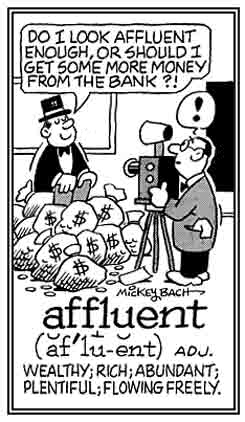-ent
(Latin: adjective suffix signifying action or being; performing a particular acion)
1. A supporter or follower of a cause or of a leader, such as someone who believes and helps to spread the doctrine of another person or group including a believer in a particular faith or church: It was obvious that the minister had a great number of adherents as shown by the multitude of people in the church where he was preaching.

© ALL rights are reserved.
Go to this Word A Day Revisited Index
As a politician, the senator was a leader with many loyal adherents.
2. A substance that can stick firmly to a surface or an object, such as glue or wax: Jim was using a strong adherent on the broken parts of the wooden chair.
Go to this Word A Day Revisited Index
so you can see more of Mickey Bach's cartoons.
adherescent (adjective), more adherescent, most adherescent
A reference to something that tends to stay with or to stick to another object: The new postage stamps are more adherescent now than those that needed a person's tongue, or wet finger, to get the glue wet so they would attach to the envelopes.
adipescent (adjective), more adipescent, most adipescent
Regarding a person or animal acquiring fatty deposits: Wendy had to be sure not to become adipescent because she wanted to take part in the upcoming fashion show.
adjacent (adjective) (not comparable)
1. Pertaining to being situated near or close to something, or to each other, especially without touching: The adjacent house to Sam's is where Eva's aunt lives.
2. Characteristic of lying near, close, or touching something else; adjoining; neighboring: The two sisters had adjacent bedrooms which were connected by a door.
3. Etymology: from Latin adjacentem, adjacens; both of which are from adjacere, "to lie at, to border upon, to lie near"; from ad-, "to" + jacere, "to lie, to rest"; literally, "to throw".
2. Characteristic of lying near, close, or touching something else; adjoining; neighboring: The two sisters had adjacent bedrooms which were connected by a door.
3. Etymology: from Latin adjacentem, adjacens; both of which are from adjacere, "to lie at, to border upon, to lie near"; from ad-, "to" + jacere, "to lie, to rest"; literally, "to throw".
1. A reference to something that is growing next to or is adhering to something else: There are adnascent parts in plants and even adnascent segments in animals that are connected to each other.
2. Etymology: from Latin adnascens, past participle of anaasi, "to be born, to grow".
2. Etymology: from Latin adnascens, past participle of anaasi, "to be born, to grow".
adolescent (adjective), more adolescent, most adolescent
1. Referring to the stage of development between childhood and maturity: Jim was in the adolescent phase of life of no longer being a child, but who had not yet reached adulthood.
2. Concerning the behavior of a young person: Jack seemed to be very adolescent and immature because he was so silly in one moment and then crying in the next..
3. Etymology: from Latin adolescent from adolescere, "to be nourished, to grow up". This is also the source of English adult from alere, "to nourish".
2. Concerning the behavior of a young person: Jack seemed to be very adolescent and immature because he was so silly in one moment and then crying in the next..
3. Etymology: from Latin adolescent from adolescere, "to be nourished, to grow up". This is also the source of English adult from alere, "to nourish".
A teenager who acts like a baby when you don't treat him like an adult.
A material that can hold or condense molecules of another substance on its surface by accumulation: It seems that activated charcoal acts as an excellent adsorbent when it is impregnated with chemicals.
advenient (adjective), more advenient, most advenient
Concerning something that originates from outward causes; additional; adventitious: Chuck's parents wondered if his bad behavior was advenient or was a flaw in his personality. or character.
Any important or epoch-making arrival; in modern usage applied poetically or grandiloquently to any arrival; onset: With the advent of the personal computer on the market, everyone stormed the stores in order to buy one!
advertent
afferent (adjective), more afferent, most afferent
Related to carrying inward to a central organ or section; such as, nerves that conduct impulses from the periphery of the body to the brain or spinal cord: Afferent nerves are also known as sensory neurons which emerge from sensory organs and the skin to carry signals from those sensory organs of the body toward the brain and the spinal cord.
affluent (AF loo uhnt, uh FLOO uhnt) (adjective), more affluent, most affluent
1. A description of someone who is wealthy, financially well off, or rich: In a truly affluent society, there's more than enough material goods offered for everyone to buy.
2. Prosperous, having sufficient financial means to live comfortably: Monroe was described as an affluent man who had plenty of money, property, and possessions to take care of his desires.

© ALL rights are reserved.

© ALL rights are reserved.
Go to this Word A Day Revisited Index
3. In an environmental context, to describe a small river or stream that is a tributary to a larger river: There is an affluent spring near Marita's home that will ultimately flow into the Mississippi River.
4. Etymology: from Latin affluentem, affluens, "flowing toward, abounding, rich, copious"; present participle of affluere, "to flow toward"; from ad-, "to" + fluere, "to flow".
2. Prosperous, having sufficient financial means to live comfortably: Monroe was described as an affluent man who had plenty of money, property, and possessions to take care of his desires.


Go to this Word A Day Revisited Index
for a list of additional Mickey Bach illustrations.
3. In an environmental context, to describe a small river or stream that is a tributary to a larger river: There is an affluent spring near Marita's home that will ultimately flow into the Mississippi River.4. Etymology: from Latin affluentem, affluens, "flowing toward, abounding, rich, copious"; present participle of affluere, "to flow toward"; from ad-, "to" + fluere, "to flow".
"It's Still Good to be Rich. Uncle Sam wants your money, and the crowd outside the gate wants your head. How to survive the populist revolt against affluence."
Word History
The metaphor of the tides that we find in the word abundance is also found in affluent. Latin affluere means "to flow to", from ad, "to", and fluere, "to flow".
From its present participle, English borrowed affluent, originally in the literal meaning "to flow toward". Its meaning broadened to "flow freely" or "abundantly". Then a figurative use developed, "flowing with riches, wealthy".
albescent (adjective), more albescent, most albescent
Regarding something growing or becoming white; shading or passing into white: The painter told Mrs. Clark that the fresh paint would turn into an albescent color, or a very pale milklike tint after drying.
An animal or a person showing parental behavior toward young that are not its own: Jane wanted to be he alloparent of the little kitten she found in the bushes near her school and take care of it at home.
altiloquent (adjective)
Speaking pompously, in a high-flown, turgid (complicated and difficult to understand) manner: "Nelson's altiloquent speech to the professors was expressed in extremely formal language in an effort to impress them and it resulted in sounding silly because of this attempted sophistication."


